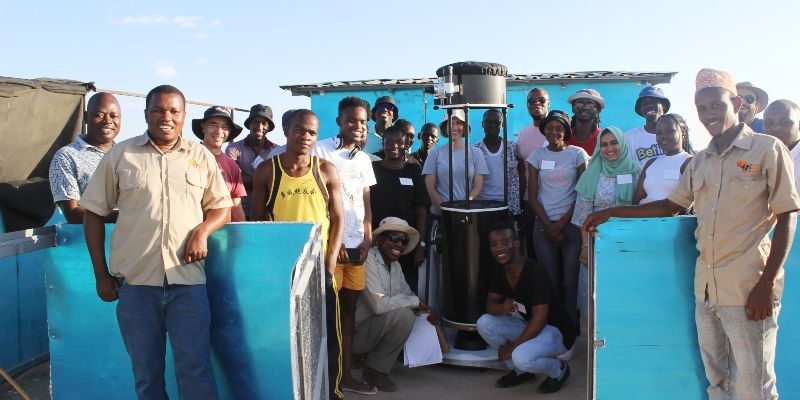
A pioneering radio astronomy project, introducing skills and expertise to countries across Sub-Saharan Africa, has received a funding boost to continue its transformational work.
The Development in Africa with Radio Astronomy (DARA) project – which is led by the University of Leeds – has already trained more than 300 students and post-graduates in eight countries since its launch eight years ago.
This new £6.5m cash injection will help to train a further 225 people over the next three years, equipping them with skills in radio astronomy and data science that they can then apply to other sectors and help address local development challenges such as water, agriculture and deforestation.
Melvin Hoare, Professor of Astrophysics in Leeds’ School of Physics and Astronomy, kickstarted the DARA project back in 2015. He said it was “great news” that new funding would help to continue the initiative’s life-changing work.
“What always drives me to keep pushing on in this project is the individual stories: meeting the African students, many of whom have come from extremely poor rural backgrounds, who never thought they would get the opportunity to study things out in space but always had that inquisitive nature,” he added.
“Now with the high-tech skills they have gained, they could come full circle and try to help their country alleviate these challenges.”
DARA is a fantastic example of how innovation and international collaboration can lead to global benefits.
This third phase of DARA is being funded by the Science and Technology Facilities Council (STFC) – part of UK Research and Innovation (UKRI) – via the International Science Partnerships Fund, in partnership with South Africa.
Transferrable skills
Professor Hai-Sui Yu, Leeds’ Interim Vice-Chancellor and President, said: “It’s tremendous this project has received further funding to provide even more students in the Global South with transferrable skills that will not only help improve their own economic prospects but could also help find solutions to local development challenges.
“DARA is a fantastic example of how innovation and international collaboration can lead to global benefits, and I’m particularly pleased that our new International Strategy Fund played a vital part in paving the way to secure this new phase.”
Part of the world’s biggest radio telescope – the Square Kilometre Array (SKA) – is being built in South Africa – the first big global science project to be hosted on the African continent. Eight other countries – Botswana, Ghana, Kenya, Madagascar, Mauritius, Mozambique, Namibia and Zambia, have partnered with South Africa, with the ambition to host an extended network of SKA dishes to deliver very high-resolution images of the radio sky. Prior to this, the South African Radio Astronomy Observatory (SARAO) will provide smaller dishes that will be developed into training facilities over the next three years.
The core of the DARA programme is intensive hands-on training in high-level computing; radio technologies; observational techniques in radio and optical astronomy; and data reduction and analysis. This will be complemented by training events and workshops in AI applications involving astronomical and Earth observation data.
Economic opportunities
The trainees also gain an understanding of potential development and entrepreneurship opportunities from DARA’s industrial partners from the space sector – all part of the project’s aspirations to do far more than simply create a new generation of radio astronomers. The aim is to develop space sector hubs with co-located services including radio telescopes, satellite downlink, and data centre facilities to foster jobs and economic opportunities.
The new phase of DARA will also fund postdoctoral fellows in the African partner institutions for the first time, in a bid to attract researchers back to their home countries. The goal is to establish local experts who can utilise the SKA, in collaboration with astronomers from the UK and South Africa.
Professor Mark Thomson, Executive Chair of STFC, said: “DARA is a leading example of strategic investment in science, with real impact across the world. Through our support of the Research Infrastructure Partnership Programme, we are reaffirming our commitment to developing high-tech capabilities across SKA partner countries and fostering new collaborations to push the frontiers of radio astronomy.”
Alongside the University of Leeds, the UK partners on DARA are the Universities of Manchester, Edinburgh, Hertfordshire, Bristol, Oxford, Durham, Stirling, and the Highlands and Islands. And in South Africa, the academic partners are the Universities of Cape Town, Pretoria, Rhodes, North West, UNISA and the Inter-university Institute for Data Intensive Astronomy.
Anna Scaife, Professor of Radio Astronomy at the University of Manchester, who led the DARA Big Data precursor project, said: “Data science skills have never been as economically valuable as they are right now. Data intensive science and Big Data projects like the SKA provide a perfect training ground for students to develop high-level skills that can be more widely applied.”
The University of Edinburgh joined DARA via a recent pilot project, also funded by the University of Leeds’ International Strategy Fund, which trialled a new optical astronomy training element in Kenya, where a 40cm optical telescope was installed. This cohort also included students from South Africa, many from historically disadvantaged institutions.
Professor Colin Snodgrass, from the School of Physics and Astronomy at the University of Edinburgh, said: “We are very excited to be joining the DARA project and expanding the training that it offers to include optical astronomy as well as radio, so that the next generation of African astronomers are able to study the sky across all wavelengths.”
Further Information
Picture: Students, tutors and Turkana Basin Institute staff with the University of Edinburgh's 40cm optical telescope. Credit: Medina Lubisia
Funding: DARA started out with a Royal Society Africa Award that was scaled up through the Newton Fund. The third phase received pump priming from the University’s International Strategy Fund. Phase three is funded by the STFC’s International Science Partnership Fund.
Industry partners include: Goonhilly Earth Station Ltd, South African National Space Agency (SANSA), Celestia Technologies Group, and Trillium Tech.
For media enquiries please email University of Leeds press officer Deb Newman via d.newman@leeds.ac.uk